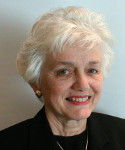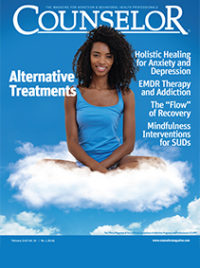Share
 Substance use disorders (SUDs) tend to run in families, but so does recovery! Both need external programs and support so all members of the family can heal at their own pace and in their own age-appropriate way. It takes time to understand the emotional and psychic devastation that accompanies addiction as it is transmitted from one generation to the next, beginning with—or at least including—the generation that is always hurt first when this insidious brain disease enters the picture.
Substance use disorders (SUDs) tend to run in families, but so does recovery! Both need external programs and support so all members of the family can heal at their own pace and in their own age-appropriate way. It takes time to understand the emotional and psychic devastation that accompanies addiction as it is transmitted from one generation to the next, beginning with—or at least including—the generation that is always hurt first when this insidious brain disease enters the picture.
NACoA looks at the plethora of compelling and concerning reports that have grown from the Centers for Disease Control and Prevention’s (CDC’s) Adverse Childhood Experiences (ACE) study with Kaiser Permanente, and thinks about the millions of children and teens suffering in silence during yet another addiction epidemic. Those who are allocating the billions of dollars to attack the problem are focusing on funding treatment, overdose prevention, and other proposed strategies to bring recovery to addicted individuals, while impacted children and families—where real prevention begins if parents and children alike can receive healing support—appear to be judged as not as worth saving.
Toxic Stress
Catching and addressing toxic stress later in life is sorely needed and the treatment of the ACoA trauma syndrome is addressing that across the country. This dynamic of treating the adult suffering from childhood trauma is increasingly recognized as a long-overdue practice—it has provided a healing journey to countless adults who have suffered long enough. But the silence remains about the need for healing support for our children, who are impacted every day by addiction’s insidious control. The silence is still deafening. Not working to alleviate the pain of today’s children living in chronic emotional stress, toxic to their neurodevelopment and affecting them for a lifetime, is dangerous to the children and irresponsible for adults. The absence of meaningful interventions and support being offered to children, who are presently experiencing trauma at very young ages, too often means that their pain and abuse is underground and often reemerges as costly physical ailments, mental health disorders, addiction, and/or aberrant behavior. It lays the groundwork for today’s children to become tomorrow’s victims of substance use and mental health disorders. The cycle continues!
The Silence
NACoA worries about those adults who are too often looking the other way and producing a kind of collective blindness on the part of professionals who might otherwise be able to intervene in children’s lives. Teachers, doctors, nurses, clergy, and all who work daily with children feel overwhelmed, as if their interventions will not be enough to stem the tide of childhood trauma when those kids go back to the homes that keep hurting them. But every little bit helps; if everyone does something small to let children know their pain is not invisible, or to connect children to some positive activity, or to spend a little extra attention on children who are hurting, those children will feel it and hold it close to their hearts. Feeling forgotten and invisible feels like a disease all its own—at least we can help with that.
Your Voice Counts
NACoA wonders how long it will take for us to see an America that actually believes our children are our best hope. That would require acknowledging our urgent obligation as a nation to protect them from the ravages of toxic stress in the families addiction has taken over. We have known what to do for thirty-five years and the tools exist to help; what we need is as follows:
Step One
We need to decide that we do believe children are our future and that they are worth protecting and nurturing, especially when SUDs move into their homes and capture their parents or older siblings.
Step Two
We can help create awareness of the often desperate lives of children living in fear and searching for hope. One way you can do that today is by joining NACoA and/or its colleague organizations and affiliates in honoring CoA Awareness Week, February 10 through 16, 2019. Visit
www.nacoa.org and review the actions you could take, the options you might have to offer, the effective messages for those with whom you interact every day, or the educational programs you can present to your friends and colleagues in casual or lunch-and-learn gatherings.
The silence has been lessened over NACoA’s many years as the voice for children of addiction, but it still looms large and remains destructive. However, every caring adult who speaks up can increase the strength of that voice until the children themselves feel safe enough to find and use their own voice in a world that today does not take care of them.
Step Three
Your voice counts! Let NACoA help you to step up and educate those within your reach. Expressing concern about a devastating public health problem hurting so many children in America, or clarifying the need that is being ignored in addressing this major public health epidemic, can start a conversation that could grow exponentially. Public awareness can begin with each of us. CoA Awareness Week can generate thousands of small conversations and simple expressions of concern, thus breaking the silence in therapy settings as well as the “public forum.” There are so many opportunities in our daily lives to break the silence that continues to trap so many children.
Just One Action by Each
When children of addiction begin to see and hear messages about what happens in their families, initially they are stunned. As they hear more messages from various sources (e.g., teachers, neighbors, clergy, primary care doctors, school nurses, and social workers), the desperate loneliness they have experienced believing they were the only ones can eventually help them feel safe enough to ask for help. If we start the conversation, how long will it take to make the plight of children of addiction—and the solutions to help—become common knowledge, making it impossible to turn away and ignore? Let us try to find out! NACoA will help.

Sis Wenger
Sis Wenger is the president and CEO of NACoA.













 Counselor Magazine is the official publication of the California Association of Addiction Programs and Professionals (CCAPP). Counselor offers online continuing education, article archives, subscription deals, and article submission guidelines. It has been serving the addiction field for more than thirty years.
Counselor Magazine is the official publication of the California Association of Addiction Programs and Professionals (CCAPP). Counselor offers online continuing education, article archives, subscription deals, and article submission guidelines. It has been serving the addiction field for more than thirty years.